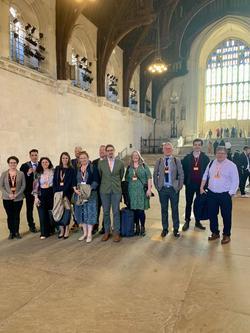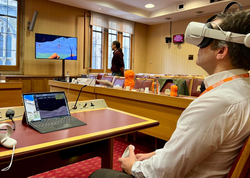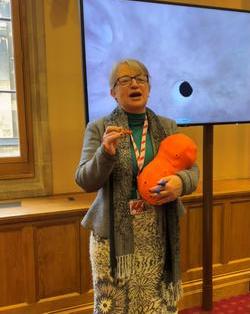Unlocking the Potential of Phages at The House of Lords

Earlier this year, I was part of an international team of microbiologists and clinicians from across the UK, USA and Belgium who came together at the House of Lords to highlight to UK legislators the crucial role that bacteriophages (phages) could play in tackling antimicrobial resistance.
Phages are viruses that infect bacteria and can be found wherever their bacterial targets exist. Known to be highly specific, phages can act as precision weapons, effectively killing their bacterial targets without disturbing healthy microbial communities. As the most abundant and diverse organisms on our planet, phages represent a bountiful resource for solutions in biotechnology, with applications in human health, agriculture and biosecurity that have been developed over the last 100 years. Now, there is an urgent unmet need for novel antimicrobial therapies and there is growing support for therapeutic phages that are primed to meet that need.
Two recent parliamentary inquiries have recognised the transformative potential of phages as novel antimicrobials. Currently only licenced for compassionate use, several challenges remain for developing more effective systems of testing, production and use in the UK. The need for better societal understanding about phages is keenly acknowledged. Despite increasing coverage in the media, the word “phage” is pretty alien in public circles, and “virus” only associated with causing disease. With a mission to improve understanding and enable more effective deployment of phage therapy for compassionate use in the UK, Dr Ben Temperton (University of Exeter) was invited by Baroness Natalie Bennet of Manor Castle to bring a team together and speak more on the topic with politicians in Westminster.

I joined Dr Temperton and Dr Tom Ashfield (Clinical Director OMGHealth; AMR policy advisor; BSAC Trustee) for an initial visit to The House of Lords in February. We brought our interactive pop-up phage infection models and a virtual reality experience developed with artist Paul Miller and Reflex Arc at The University of Salford to demonstrate how phages work. Politicians that visited the event were invited to take sampling kits back to their constituencies to collect water samples that would contribute to University of Exeter’s citizen phage library.

We returned to The Houses of Parliament for full day of round table discussions in April with a larger team of researchers from The Universities of Exeter, Leicester, and Liverpool, presenting strengths in UK phage research with case studies from The Trailfinder-CF innovation hub and the Becky Mayer Centre for Phage research . We were joined by UK clinicians from The Royal Free and Royal Devon and Exeter Hospitals who provided insights into frontline experience of AMR, and the current challenges in effective use of phage therapy in the NHS. The audience learned from the experiences of Yale University in USA in establishing small batch phage preparations for compassionate use and industrial preparation of GMP phages for clinical trials. We also heard about successes at Queen Astrid Military Hospital in Belgium, where phages have been applied (in more than 200 patients) as magistral preparations. Representatives from MHRA, UKHSA and Phages for Global Health joined the discussion about how we can work together to address the challenges faced in effective phage therapy in the UK and beyond.
There is an important role for scientists to play in effective communication across sectors to overcome key challenges in AMR so that we can drive forwards real change. The team is looking to bring as much awareness to the topic as possible. Since our visit there have been further questions asked about phages in parliament and several follow-up meetings with MPs across the country. A series of engagements are planned, including workshops with schools, healthcare associations and industry partners, as well as the launch of the PhageColab portal to act as a resource for information about phage therapeutics.
About the author: Chloe James is a professor in Microbiology at The University of Salford. Her research focuses on uncovering new aspects of phage-bacteria interactions and developing educational tools to improve understanding of AMR and phage biology.
Other members of the team: Dr Ben Temperton (University of Exeter); Prof Martha Clokie (University of Leicester); Prof Jo Fothergill (University of Liverpool); Dr Antonia Scobie (Royal Free Hospital); Dr Phil Mitchelmore (Royal Devon and Exeter Hospital); Dr Mark Sutton (UKHSA); Dr Carmen Coxon (MHRA); Drs Ben Chan & Jon Koff, (Yale) and Dr Jean-Paul Pirnay (Queen Astrid Military Hospital); Dr Tobi Nagel (Phages for Global Health).
